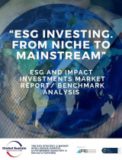Global Sustain Group conducted and released recently a new ESG/SRI & Impact Investments Market Report and Benchmark Analysis, entitled “ESG Investing. From Niche to Mainstream”.
The report provides insights of the ESG market in Europe, in USA and globally, presenting selected and approved leading asset management firms, examining their ESG strategy and investments.
The full version of the report is over 70 pages and it includes ESG/impact investments market metrics, trends, facts and figures, main ESG investment strategies, models, ESG funds’ performance ranking, benchmark analysis of some of the leading asset management firms in the sector from Europe (mainly from UK, Germany, Switzerland, France, Netherlands) and USA.
According to the report and the data provided by the Global Sustainable Investment Alliance (GSIA) in 2016, 22.89 trillion USD of assets were being professionally managed under responsible investment strategies, a growth rate of 25% since 2014. In 2016, around 26% of professionally managed assets had SRI/ESG strategy elements. It is estimated that in 2016, in Europe in terms of value, total assets of over 12 trillion EUR were managed with SRI/ESG strategies.
Global Sustain, a PRI member signatory and GRI data partner, conducts benchmark research and analysis reports using metrics based on international best practices. The methodology is based on a structured, detailed and in-depth analysis that allows the report to become an essential tool for decision making.
Conclusion and recommendations
Academic studies, financial and investment analysis, market experience and market stats and trends indicate that ESG Screening, Selection and Integration pays off especially on mid-term and long-term investment strategy.
There is growing consensus but also evidence, which indicates that ESG integration into investment strategy identifies and reduces risks, identifies hidden opportunities and hidden champions and contributes to mid-term and long-term outperformance of investments. That is confirmed by the positive trend in last years of the ESG market metrics and the outperformance of ESG funds.
Moreover, is important to overcome stereotype perceptions about ESG strategies such as the one that ESG integration means sacrifice of financial returns. Numerous studies indicate that there is correlation between financial performance and ESG performance.
The number of asset owners and asset management firms which include ESG metrics into their investment strategy is also growing steadily. For asset owners and asset managers, ESG relevant investment strategies become gradually from niche strategies to mainstream strategies and a regular component of investment decision-making.
Although many asset management firms as well as the selected ones analyzed above use ESG metrics, it is clear each of the applied ESG investment strategy does not lead to the same results, since different sub investment strategies, different methods and different tools are used.
Download here a summary of the Report with a detailed content outline.




